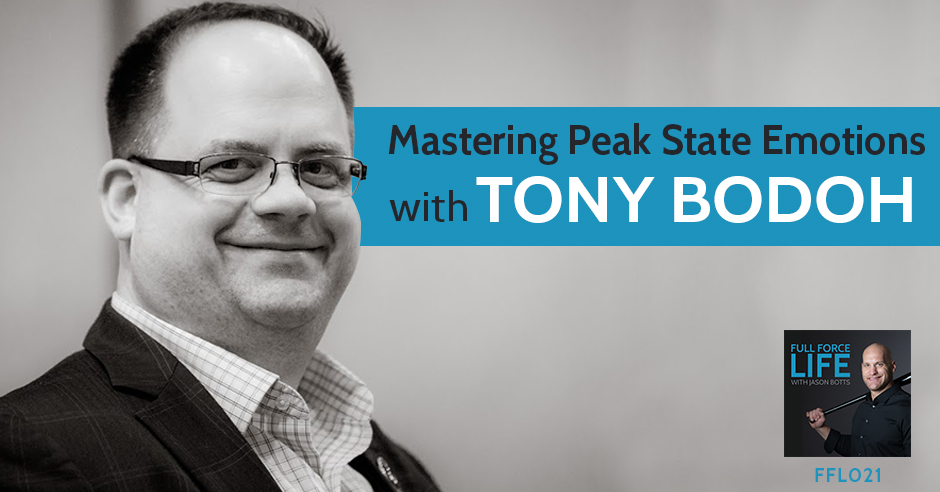Mastering Peak State Emotions with Tony Bodoh
Description

This interview’s going to be a little different today. We’ve got Tony Bodoh, a number one bestselling author, a man who’s cofounded five companies, a wide array of different types of companies. He does executive coaching as well now. He is just a brilliant, brilliant mind. You’re probably asking yourself how is this going to help me today, because more than likely you are an athlete or a coach or a parent. Let me tell you, Tony is a true expert. One of his gifts is being able to break down the little things, the littlest moments, the littlest actions. That’s one of Tony’s true gifts.
In this conversation, he breaks down and he gives us an awareness of some little small moments and how we react and why we do that, why we’re already trained and conditioned ourselves to react with frustration or with anger or with sadness, whatever it is, whatever happens on that field. Tony’s going to break that down for us. Most importantly, he’s going to show us how we prepare ourselves and how we can train ourselves to react in a way that is going to service on the field the way that we want it, towards our goals and our vision. You know me, when it comes to the full force, when it comes to that slogan, Be Full Force, Live Full Force, Play Full Force, it’s when you’re congruent and aligned and everything is moving forward. You are going to want to have these little moments, these little things that Tony talks about rolling in the direction that you want to go if you want to go out there and play your very best today and play your very best long-term. You’re going to want to master these little moments that Tony’s going to talk about today.
I want to just give him a huge compliment because Tony has a brilliant gift. He has this brilliant mind, a beautiful gift of his. He’s able to dissect these small little things, these little moments. His greatest gift in my opinion is he has this beautiful mind that doesn’t make you feel dumber talking to him. In fact, it’s the exact opposite. His true beautiful gift that he has is he raises you up. You have these brilliant insights, brilliant new distinctions and takeaways when you talk with him. That’s the best part of Tony in my mind, because you will hear it in this interview. You’ll hear me say things that probably sound smarter and more clever than anything that you’ve ever heard on any other episodes. That is not me, that is all Tony. I’m so grateful to be able to call him a friend and a mentor as well. Without any further ado, I want to call Tony up to the plate. He and I will see you on the other side.
Listen to the podcast here:
Mastering Peak State Emotions with Tony Bodoh
Today, I’ve got another great guest, a very good friend of mine. It’s going to be a little different, a little unique. He is a man, he is a master and he is an expert in the field of customer experience. Yet here I got him talking to you because the guy knows quite a bit as well about the idea of peak performance. Without any further ado, Tony Bodoh, please say hi to everybody out there.
Hello, everybody. Hello, Jason. Good to be on your show.
Talk a little bit about your background, I’d like to hear some more. As an Extreme Focus coach too, you do such an incredible job of breaking down things like flow and peak performance and all these things that so many athletes think about and talk about. I’m just curious how you have taken what you’ve been great at as well as understanding all this stuff and just tying it all together and be on something like this where you could help us as well.
I started my career out as an analyst, a real nerd geek, not the type of person you’d expect to be talking on an athletic show. Really what happened for me was I got into a place where I was studying human behavior through marketing, so why people were buying products and services. I was in direct mail for many years, and hospitality after that. One day back in 2007, it was early January, my VP had us in our usual weekly meeting. He says, “Tony, you’re now in-charge of all customer satisfaction for the hotel brand.” We’re talking millions of guests a year. I had never written a survey. I had avoided Psychology classes. In my undergrad, I’ve got a History Bachelor’s degree of all things. In my MBA program, I tried to avoid as much as I could because I thought psychology was that soft stuff that didn’t make a difference. I was focused on process improvement and looking at how operations can run better and companies can run smoother and all that. I’d never thought about psychology. I had a choice. I remember going back to my office and just staring out the window, there was snow in the ground. I could see the Cumberland River there. I’ve got a choice to make. I could either go back to my VP and tell him I don’t know what the heck to do or I can go figure it out. I pulled up Google and I started Googling. Literally, a year later, because of what I learned and how I applied and what I did, really putting a lot of the principles that you and I practice daily before I even knew them, putting those things in place.
<figure class="wp-caption alignright" id="attachment_649" style="width: 300px;">
 <figcaption class="wp-caption-text">Peak State: A lot of our decisions are made before we’re even consciously aware.</figcaption></figure>
<figcaption class="wp-caption-text">Peak State: A lot of our decisions are made before we’re even consciously aware.</figcaption></figure>A year later, I was in an international stage talking about how to apply the technology that we had done to customer experience, how to really unwrap the emotion of customer experience and how it tied into decision-making. I like to tell people today, I’ve spent the last seventeen years of my life really studying human experience and the emotions that drive human decision making. That’s where it really ties into what we’re talking about here today because we have all of these emotions that are running through us all the time, constantly throughout the day. Yet we’re not even aware how they’re affecting our decision-making. For a lot of our decisions, some people say as many as 90% of our decisions, they’re made before we’re even consciously aware, somewhere between three and seven seconds before we’re aware. Everything that we’re deciding on a daily basis, what to eat, where to go, who to talk to, what to say, all these stuff happens, I call it pre-consciously, before we even know that the decision is happening. We use our logic to justify the decision we just made.
You’re basically talking about the decisions being made before we actually decide. The way we react is our decision without even thinking about it.
Exactly. When you’re facing a challenging moment in life or in sports, you’re at the plate ready to swing the bat, you’re facing that moment, there’s what’s called integral emotions. These are emotions that come up because of the challenge you’re facing. There’s also residual emotion. The residual emotion would be what you bring to the plate from the last time you were at bat or what your manager just said in the dugout, and what your coach has been saying. All those past emotions coming with you to the plate. There’s two parts to it.
Basically you’re saying, the residual is like me this last week, I’m 1 for 16. I’m not feeling very good, I’m not feeling very confident in the plate. That’s the residual emotion. Also I step in, I dig into the batter’s box and all of a sudden I look, I see the first two pitches, they’re strikes, right on perfect corner, now I’m scared to death of what this guy’s going to throw me and this guy’s got me beat again. How do you refer to that? Integral?
Integral, it’s integrated into the actual challenge of the moment.
When I hear you talk about the micro moments of decision, for athletes, it’s about preparing yourself on how you are going to react on those moments. That’s where the principles come into tie as well as tools like visualization or affirmations. If you’re preparing for either one of those, are they different in how you prepare or are they the same?
<figure class="wp-caption alignleft" id="attachment_651" style="width: 300px;">
 <figcaption class="wp-caption-text">Peak State: The emotion that you trigger in that moment actually drives your decision to how you’re going to behave.</figcaption></figure>
<figcaption class="wp-caption-text">Peak State: The emotion that you trigger in that moment actually drives your decision to how you’re going to behave.</figcaption></figure>They’re different in so far as the residual emotions, we don’t even know that they’re there most times, unless we’re highly attuned and highly aware and we develop that capability. But in the moment, you don’t want to get that intense. Let’s say you’re at the plate and you’ve got two strikes thrown at you. There are a lot of ways you can respond but the two emotions that might come up would be fear, “What’s going to happen if he throws another strike? Am I going to hit it?” Fear usually results in not taking action. You actually pull back. Whereas if you get angry, “I’m going to get that,” you will attack it. The emotion that you trigger in that moment actually drives your decision to how you’re going to behave. Are you




